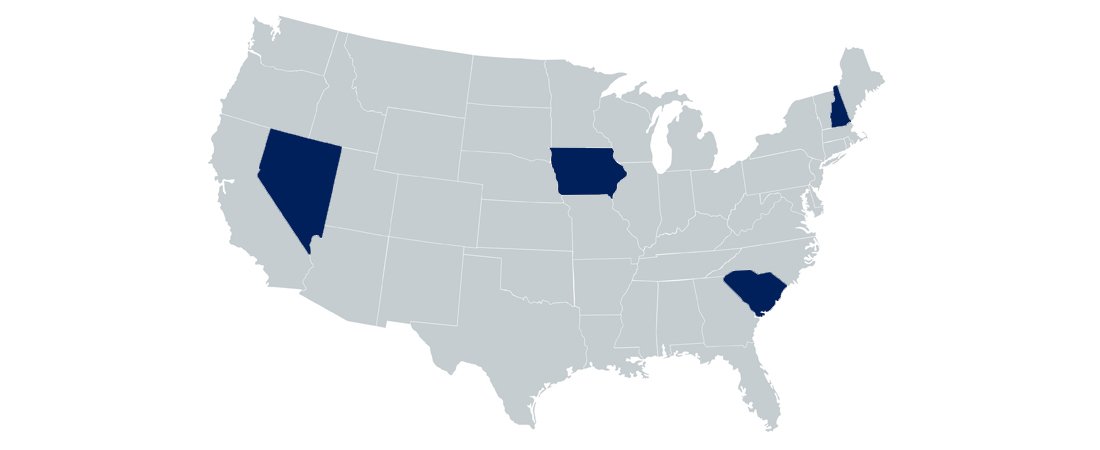Glossary of terms
As voting in the Democratic Primary gets underway, Portland will provide you with all the information you need to understand the race for the 2020 Democratic nomination. But first, a few key terms:
- Delegate: A state party representative that attends the national party’s nominating convention and casts a vote for their respective candidate. US primary elections award delegates through proportional representation based on each state’s election results. The candidate with a majority of delegates wins the nomination
- Primary: A traditional election contest where voters arrive at a polling place and cast a ballot for their preferred candidate to represent their party in the General Election
- Caucus: A meeting of members from one party in a county or district. Collectively, they debate the candidates and vote. The candidates with the lowest number of votes are eliminated round by round until there is a winner
February features four state election contests in Iowa, New Hampshire, Nevada and South Carolina. Success in these states is critical for candidates if they are to make it to Super Tuesday on 3 March – the day where the largest number of states and US territories hold primary contests. Including the two states with the largest number of delegates: California and Texas.
IOWA
What you need to know:
- 3 February 2020
- 41 delegates
State breakdown
Iowa is the first state to vote, a position of pride that Iowa has fiercely guarded. Iowa receives tremendous time and attention from candidates hoping to get an early win and the momentum and media attention that comes with it.
Polling from Real Clear Politics polling data aggregate [1]
- Sanders, 25 per cent
- Biden, 22 per cent
- Buttigieg 17 per cent
- Warren, 13.5 per cent
- Klobuchar 8.5 per cent
Sanders has surged to the lead in Iowa ahead of Biden. Buttigieg is eight points behind Sanders but with 45 per cent of voters remain uncommitted to their top choice, it’s all to play for.
What to watch
Candidates who succeed in Iowa have both a pathway to the nomination, as well as appeal in the Midwestern states that are critical to winning the presidency. A poor performance in Iowa will force some candidates out of the race.
NEW HAMPSHIRE
What you need to know:
- 11 February 2020
- 24 delegates
State breakdown
New Hampshire receives significant time and attention from candidates. Campaigning in the state involves going door to door and meeting individually with voters.
Polling from Real Clear Politics polling data aggregate [2]
- Sanders, 23 per cent
- Buttigieg, 15.8 per cent
- Biden, 14.8 per cent
- Warren, 12.4 per cent
- Klobuchar, 7.4 per cent
Polling in New Hampshire shows that many of the traditional frontrunners are losing support to lower tiered candidates with Sanders holding a commanding lead over the rest of the field.
What to watch
New Hampshire is the first chance for the candidates to test their appeal outside of the Democratic base. New Hampshire allows independents to vote in the primaries, providing an early test of candidates’ ability to move beyond the Democratic party base.
NEVADA
What you need to know
- 22 February 2020
- 36 delegates
State breakdown
Nevada is a test of a candidate’s appeal to both the Western portion of the US as well as to a large Latino population.
Polling from Real Clear Politics polling data aggregate [3]
- Biden, 25 per cent
- Sanders, 19.3 per cent
- Warren, 14.7 per cent
- Buttigieg, 7.7 per cent
- Steyer, 7.3 per cent
Polling in Nevada shows that Biden enjoys a commanding lead over Sanders, but this could change depending on how they perform in Iowa and New Hampshire.
What to watch
In previous elections, Democrats have enjoyed a majority of support from Latino voters, but historically, they don’t always turn up to the polls in high numbers. Reversing this trend and getting them to commit to voting is critical to Democratic hopes in 2020. The Sanders campaign has made a major investment in Latino voter outreach and the success of these efforts could be an indicator of his and Democrats’ success down the road.
SOUTH CAROLINA
What you need to know:
- 29 February 2020
- 54 delegates
State breakdown
South Carolina is the fourth and final February contest in the Democratic Primary. Additionally, it is the first state with a significant population of Black voters and as such serves as the bellwether for a candidate’s electability among a demographic that has historically supported Democrats in General Elections.
Polling from Real Clear Politics polling data aggregate [4]
- Biden, 32 per cent
- Sanders, 15 per cent
- Warren, 14 per cent
- Steyer, 8.3 per cent
- Buttigieg, 6.3 per cent
Biden is the clear frontrunner in South Carolina, there has been some jostling among the lower polling candidates, but Biden’s strong support among Black voters has kept him clear of the field.
What to watch
Since 1988, every Democratic candidate to win the nomination had a majority of support from black voters. The way delegates are awarded in the primary process means that strong support from this voting bloc lends a structural advantage to the candidate with the most support from them. In this case Biden. South Carolina will test whether any other candidate can make inroads with black voters, if they can’t, Biden will have the inside track to the nomination.
[1] Polling up to date as of 27 Jan 2020[2] Polling up to date as of 27 Jan 2020
[3] Polling up to date as of 27 Jan 2020
[4] Polling up to date as of 27 Jan 2020

